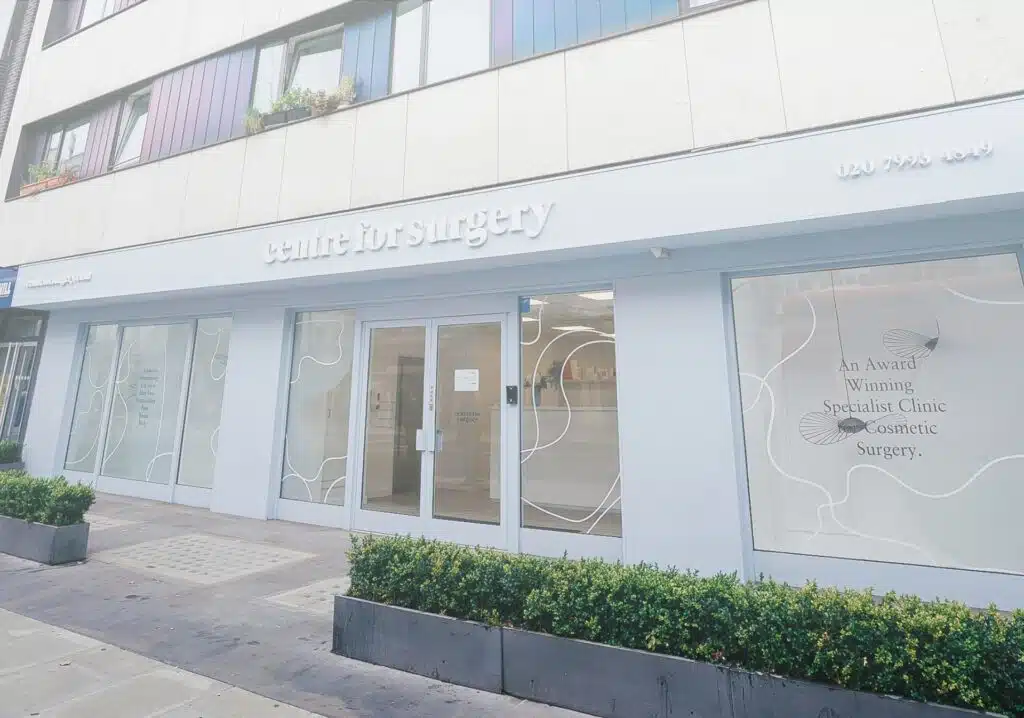Pelvic floor repair in London
Pelvic floor repair at Centre for Surgery is a surgical procedure to treat pelvic floor disorders, which are conditions that affect the muscles and tissues that support the organs in the pelvic region. The pelvic floor is a complex network of muscles, ligaments, and tissues that form a “floor” to support the organs in the pelvis, including the bladder, uterus, and rectum.
Pelvic floor disorders in the UK can result from a variety of factors, including childbirth, ageing, obesity, surgery, and chronic coughing. These disorders can lead to symptoms such as urinary incontinence, pelvic organ prolapse, faecal incontinence, and pelvic pain.
Pelvic floor repair surgery can be performed in various ways at Centre for Surgery in London, depending on the specific condition and its severity. In some cases, minimally invasive techniques such as laparoscopy or robotic surgery may be used. In other cases, traditional open surgery may be necessary. The specific type of pelvic floor repair surgery will depend on the individual case, including the type of pelvic floor disorder and the extent of the damage and may be combined with vaginoplasty or perineoplasty as part of a vaginal rejuvenation procedure.
RELATED: Loose Vagina – Causes and Treatments
The goal of pelvic floor repair surgery is to restore the normal function of the pelvic floor, including improving bladder and bowel control and reducing pain and discomfort. In some cases, the surgery may also involve the repair or reconstruction of the vaginal walls, the uterus, or the rectum.
RELATED: What is Vaginal Tightening Surgery?
Pelvic floor repair surgery is a complex procedure, and recovery can take several weeks or months. Additionally, some individuals may still experience residual symptoms even after successful surgery. As with any surgical procedure, there are also risks and potential complications associated with pelvic floor repair, including bleeding, infection, and scarring.
Pelvic floor repair is a surgical procedure that can help treat pelvic floor disorders and improve the quality of life for those who are suffering from these conditions. However, it is important to discuss the risks, benefits, and expectations of the procedure with a qualified cosmetic gynaecologist to determine the best course of action.
What Causes Pelvic Floor Disorders?
Several factors can contribute to the development of pelvic floor disorders, including:
Childbirth
Pregnancy and vaginal delivery can weaken the pelvic floor muscles, leading to pelvic floor disorders.
Ageing
As we age, the muscles and tissues in the pelvic region can weaken, making it more difficult to control bladder and bowel function.
Obesity
Excess weight can put additional pressure on the pelvic floor, increasing the risk of pelvic floor disorders.
Surgery
Some types of surgery, particularly those in the pelvic region, can weaken the pelvic floor and increase the risk of pelvic floor disorders.
Chronic coughing
Chronic coughing, as seen in conditions such as bronchitis or smoking, can put additional strain on the pelvic floor and contribute to pelvic floor disorders.
If conservative treatment options, such as lifestyle changes, physical therapy, or medications, do not effectively relieve symptoms, pelvic floor surgery may be recommended. The specific type of surgery will depend on the individual case, including the type of pelvic floor disorder and the extent of the damage.
Why You May Need Pelvic Floor Surgery?
Pelvic floor surgery is typically recommended for women suffering from pelvic floor disorders, which are conditions that affect the muscles, tissues, and ligaments that support the organs in the pelvic region. These disorders can lead to a range of symptoms that impact the quality of life, including:
Urinary incontinence
The involuntary loss of urine can occur during physical activity, coughing, sneezing, or other movements.
Pelvic organ prolapse
A condition in which one or more pelvic organs, such as the bladder, uterus, or rectum, bulge into the vagina.
Faecal incontinence
The inability to control bowel movements leads to unintended loss of faeces.
Pelvic pain
Pain in the lower abdomen and pelvic region can be caused by various factors, including endometriosis, interstitial cystitis, or pelvic floor muscle tension.
Pelvic floor surgery is a complex procedure, and recovery can take several weeks or months. Additionally, some individuals may still experience residual symptoms even after successful surgery. As with any surgical procedure, there are also risks and potential complications associated with pelvic floor surgery, including bleeding, infection, and scarring.
Pelvic Floor Repair Specialists
Dr Paraskevi Dimitriadi is a specialist cosmetic gynaecologist and has trained at some of the world’s leading hospitals in all aspects of gynaecology, including laser vaginal treatment. Dr Dimitriadi continues to practice in a major London teaching hospital. She takes an active interest in research into aesthetic gynaecology and lectures both nationally and internationally on a range of topics in aesthetic gynaecology. She is a full member of the European Society of Aesthetic Gynaecology (ESAG).
As a female surgeon, Dr Dimitriadi understands her patient’s most delicate needs and preferences, which allows her to create a personalised and bespoke vaginal rejuvenation treatment plan to meet the patient’s goals. She is regarded as one of the top cosmetic gynaecology surgeons in London by her peers and brings years of experience to each and every procedure she performs. Dr Dimitriadi brings together her expertise across both surgical and non-surgical gynaecological treatments – unrivalled in London and exclusive to Centre for Surgery.
Dr Dimitriadi is known for her caring, patient-centred approach, supporting all her patients and she always strives to optimise patient outcomes at stages of the patient journey.
RealSelf Top Doctors
RealSelf’s top doctor status is awarded to less than 10% of the RealSelf doctor community. This status is earned by achieving consistently high patient satisfaction (from RealSelf reviews), getting excellent feedback on expert answers to patient questions, and investing significant time in Q&A and other doctor activities. RealSelf’s top doctors are rated among the very best surgeons in the United Kingdom.
Traumatic childbirths with resultant tearing of the vaginal and labial tissues can be a significant source of distress and loss of function. Common endpoints of difficult childbirths can be visible scarring and distortion of the vagina tissues, which can be a cause of pain and discomfort. Sometimes the surgical repair immediately after childbirth to repair the torn and stretched tissues is suboptimal. Women can develop a loss of confidence and may experience discomfort during sexual intercourse from residual scar tissue. Dr Dimitriadi is an expert in laser vaginal tightening for mild to moderate cases of pelvic organ prolapse.
RELATED: What is perineoplasty?
More severe cases may result in weakness of the pelvic floor muscles, which act as a supportive hammock for the uterus, bladder and rectum above. When this structural support is weakened, it can lead to pelvic organ prolapse. Difficulty in passing urine may occur, and in severe cases, urinary incontinence may develop, which can be a very socially disabling condition.
Our gynaecologists are experts in the repair and restoration of the vagina and pelvic floor. This can lead to a significant improvement in self-confidence and self-esteem. Surgical treatment such as vaginoplasty can be both aesthetic and reconstructive in nature depending on the underlying problem, whether the issue is in the perineum or deeper in the underlying vaginal tissues. You can be assured of being in excellent hands for your vaginal repair and reconstruction procedure at our specialist gynaecology clinic at Centre for Surgery in London.
Recovery after pelvic floor surgery
Recovery after pelvic floor surgery can vary depending on the type of procedure and the individual’s overall health. In general, most people can expect to experience some discomfort and pain after the surgery, which can be managed with prescribed pain medication. It is important to follow all postoperative instructions provided by your healthcare provider, including any restrictions on physical activity and information about wound care.
Pelvic floor repair surgery: This procedure is performed to repair damage to the pelvic floor muscles and tissue caused by childbirth or other conditions. After the surgery, it is common to experience pain and discomfort in the abdominal and vaginal areas. Most people can expect to be off their feet for the first few days and then gradually return to normal activities over the next few weeks. Complete recovery can take several months, and physical therapy may be recommended to help improve strength and flexibility.
Every individual’s recovery experience is unique, and the timeline for recovery can vary based on the type of procedure and the person’s overall health. Follow all postoperative instructions from your doctor and communicate any concerns or problems to them in a timely manner.
Pelvic floor repair at Centre for Surgery
Centre for Surgery is considered the leading Centre in London for treating uterine, prolapse and damaged pelvic floor using minimally invasive techniques. Dr Dimitriadi has many years of experience treating women with damage to the pelvic floor caused by pregnancy, injury or the natural ageing process.
Why choose Centre for Surgery?
- As many preoperative consultations with your surgeon as you like to make sure the procedure is right for you
- Treatment at a specialist day surgery facility recently rated ‘Good’ by the CQC
- Enhanced same-day discharge with the added benefits of recovering in your own home
- 24/7 clinical support from your surgeon for the first 48 hours and our expert postoperative support team
- Your very own dedicated patient coordinator to act as your personal point of contact throughout the patient journey
- In-depth preoperative medical assessment to make sure you are fully fit for your procedure
- Exceptionally high standards of postoperative care described as ‘outstanding’ by the CQC with regular telephone and face-to-face checks
Schedule an in-person consultation at our state-of-the-art Baker Street clinic in Marylebone by calling us on 020 7993 4849 or completing the contact form below.
FAQs
-
What is pelvic floor repair?Perineum and pelvic floor repair is a reconstructive gynaecology treatment to address both the aesthetic appearance of the perineal region in addition to the restoration of the pelvic floor and the muscles which are responsible for stabilising the pelvic floor. The pelvic floor musculature may have been damaged as a result of a vaginal delivery.
-
What type of anaesthetic is used for pelvic floor repair?For very minor perineal repairs, it may be possible to undertake the procedure under local anaesthetic. Due to the potential scar tissue which can prevent the adequate spread of local anaesthetic, your surgeon may advise treatment under a general anaesthetic in virtually all cases of perineal and pelvic floor repair. Being under GA means you should not feel any pain or discomfort. Postoperative pain or discomfort is well controlled with over the counter pain killers which should not be required for more than 5-7 days.
-
What is the recovery period like after pelvic floor repair?After the perineal or pelvic floor repair, it is common to feel a mild degree of discomfort but this usually settles down within a week. Swelling may take longer to resolve but should not interfere with your function. Patients may return to light work activities after one week but you are advised to avoid strenuous exercise, sexual intercourse or lifting heavy objects until full healing has taken place by about six weeks.
-
When can I return to normal activities after pelvic floor repair?It is normal to expect some bruising and swelling at the site of the procedure and there may be some mild discomfort which settles down within a week of surgery. It is sensible to keep mobile and walking around the house is easily done within a couple of days. It will take up to 3 months for the final results to become evident. You should avoid sexual intercourse and strenuous exercise for the first 6 weeks after surgery.
-
What are the risks and potential complications of pelvic floor repair surgery?As with any surgical procedure, there are certain risks and these include the risk of having a TIVA general anaesthetic if you decide to have your procedure under GA. Bleeding and surgical site infection are well-known risks of surgery but are fortunately rare. At the consultation, your surgeon will explain the risks specific to pelvic floor repair surgery.
-
How much does pelvic floor repair cost in London?Prices start at £6500, and the final price will be confirmed after your face-to-face consultation with our cosmetic gynaecologist.















